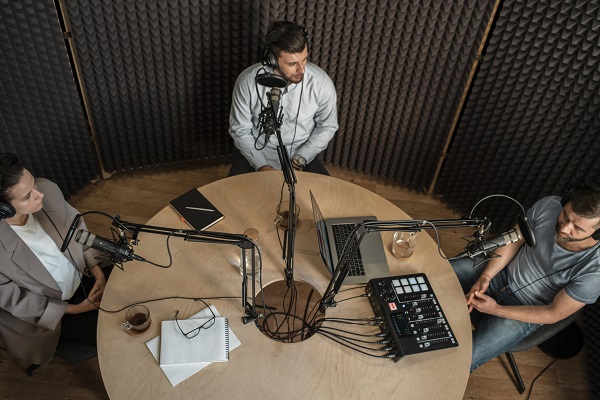Collaboration Etiquette in a Music Studio

You should always be aware of the importance of collaboration etiquette in a music studio.
From respectful communication and space considerations, to audio quality and scheduling, all the way to musical ideas and payment terms - it all plays a vital role in having a successful recording experience.
So, let's dive in and take a look at the various aspects of collaboration etiquette in a music studio that can help ensure a smooth and successful session.
Key Takeaways
-
Actively listen and engage in constructive dialog
-
Show respect for opinions and ideas
-
Foster an environment of creative experimentation
-
Be open-minded to different approaches
Respectful Communication
Communicate respectfully with your collaborators while in the music studio by actively listening and engaging in constructive dialog. Show respect for their opinions and ideas, and be open to their feedback.
Demonstrate good listening skills by paying attention and asking questions to gain clarity. The key to successful collaboration is effective communication, so use precise language to convey your ideas.
Show your colleagues that you're open to constructive criticism, and remain professional and courteous when giving or receiving it. Avoid fluff and strive for clarity, conciseness, and precision.
This is the foundation of respectful collaboration in the music studio.
Space Considerations
When collaborating in a music studio, it's important to be mindful of your space and respect the needs of those around you. Be considerate when sharing the studio space and keep noise levels to a minimum. Aim to be as organized and tidy as possible, and ensure that all equipment is put back in its proper place after use.
When recording, take care to minimize sound leakage and be aware of how much noise you're making.
Finally, remember to be respectful of everyone's time and don't monopolize the space.
Audio Quality
Provide all of your audio equipment and take all necessary steps to ensure the highest quality of sound.
When sharing equipment, it's essential to take extra care to ensure that it's properly set up and functioning correctly.
Additionally, it's important to practice noise control to minimize the amount of background noise that can disrupt sound quality.
Finally, it's essential to properly set up feedback loops to ensure that the audio is clear and accurate.
Scheduling
Once you have established the highest quality of sound, it's important to coordinate a schedule that works best for everyone involved. Arriving punctually and respecting deadlines are key components in successful collaboration.
Make sure to provide everyone with a clear timeline for rehearsals, recording sessions, and mixing. Communicate openly and efficiently to ensure everyone is on the same page. Documenting the agreed upon timeline is also a good idea, in case any miscommunication arises.
It's important to be mindful of each member's availability and provide sufficient time for breaks and meals. Setting boundaries on the studio time is a must, to ensure everyone is able to get the most out of the session.
Following these guidelines will ensure a productive and enjoyable collaboration experience.
Musical Ideas
Additionally, when collaborating with other musicians it's important to foster an environment of creative experimentation. Listen intently to each other's ideas, and don't be afraid to ask clarifying questions. Respect each other's contributions, and try to be open-minded to different approaches. Give honest feedback, and don't be afraid to express your opinion.
Keep in mind that the goal is to create something unique, so don't be afraid to try new things. Be flexible and willing to compromise, and don't be afraid to admit when something isn't working. Finally, be sure to thank each other for ideas, and celebrate success together.
With these key principles in mind, collaboration in the music studio can be a rewarding experience.
Payment Terms
When collaborating in a music studio, it's important to discuss payment terms upfront. Establishing a timeline for time tracking, as well as expectations for financial transparency, will help ensure a successful collaboration.
Set expectations for how and when payment will be made, and when invoices should be sent. Additionally, discuss how much pay is expected for each session or project. This will ensure both parties are on the same page and help to avoid any financial misunderstandings.
Conclusion
Collaborating in a music studio is an exciting and rewarding experience. By following a few simple etiquette rules, everyone involved can have a successful and enjoyable experience.
-
Respecting one another: It is important to treat fellow collaborators with respect. This includes listening to each other's ideas, giving constructive feedback, and being open to compromise.
-
Being considerate of the space: Keep the studio clean and organized. Put equipment back in its proper place after use and avoid clutter. This helps create a comfortable and productive environment for everyone.
-
Keeping the audio quality high: Pay attention to sound levels and avoid excessive noise or distractions during recording sessions. This ensures that the final product will be of the highest quality.
-
Scheduling and discussing musical ideas: Communication is key in any collaboration. Set clear schedules and deadlines, and make sure to discuss and plan out musical ideas together. This helps to avoid conflicts and ensures that everyone's input is valued.
When it comes to payment terms, it's important to be clear and upfront to avoid any misunderstandings. Discuss payment arrangements and make sure everyone is on the same page before starting the collaboration.
By keeping these guidelines in mind, everyone can have a positive and rewarding collaboration.
No Comment